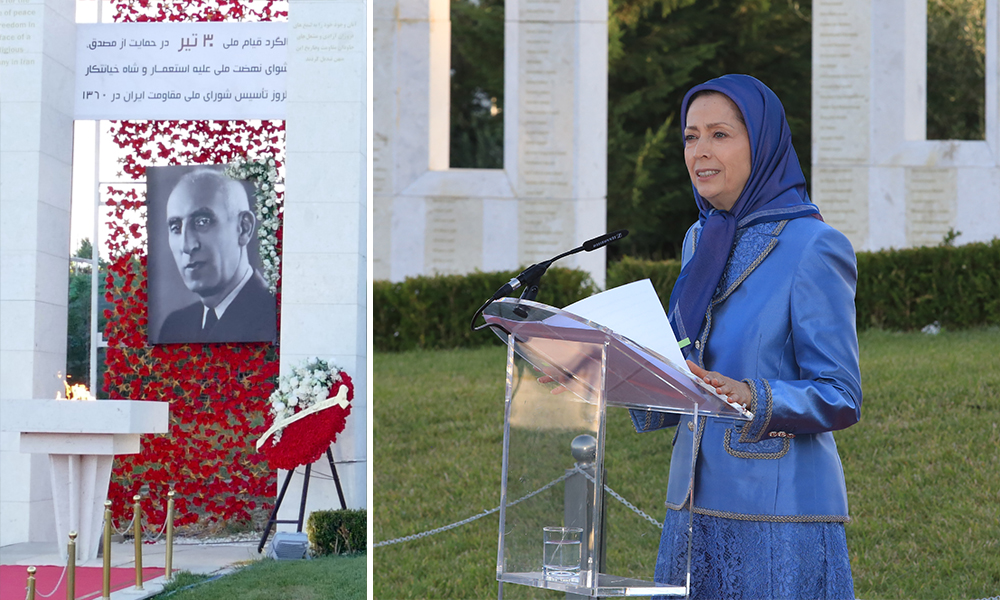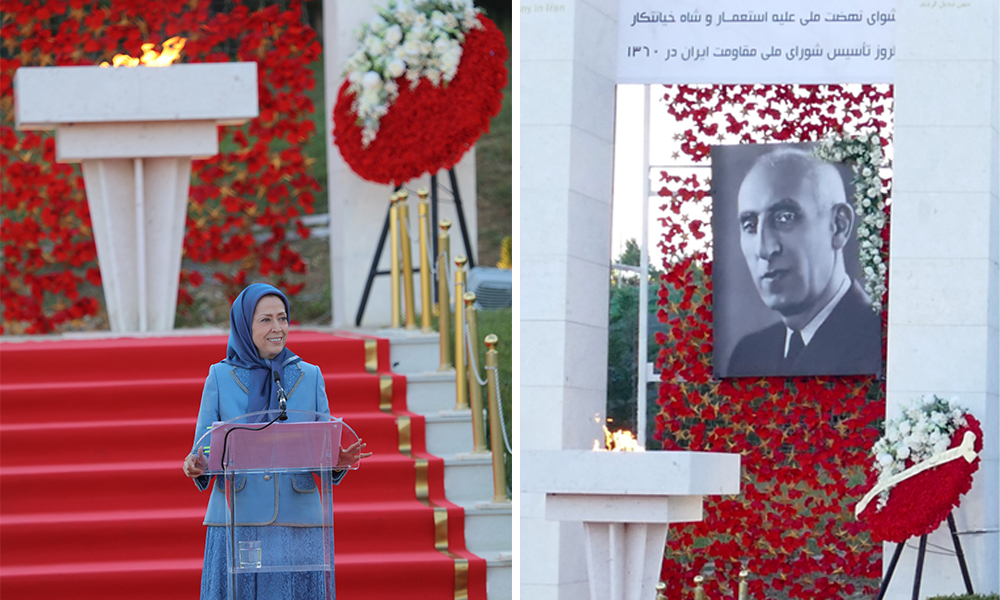Maryam Rajavi: To the great Mossadeq, we say, the Iranian nation is determined and steadfast in its struggle for freedom

Remarks at the Ashraf-3 ceremony commemorating the Iranian people’s uprising on July 21, 1952
On the 70th anniversary of the Iranian people’s great uprising on July 21, 1952, we salute Dr. Mohammad Mossadeq, the leader of the Iranian people’s national movement against colonialism.
July 21, 1952, the test for the Iranian nation
As Dr. Mossadeq said on the first anniversary of that great uprising, “July 21 is unforgettable in the history of the Iranian people’s ongoing struggles. Because on that day, all Iranians, of all classes and posts, acted in unison and did not rest until they achieved their objective.”
We salute the martyrs of the national uprising of July 21, 1952, and join the great Mossadeq, in “offering our deep respect and honor” to the memory of those fallen in the path of freedom and liberty.
Indeed, paving the path to freedom and independence is only possible through the great sacrifice of the nation’s best children and the suffering endured by the pioneers of this path.
This is why the Iranian nation’s uprisings, from July 21, 1952, to June 20, 1981, are, as Dr. Mohammad Mosaddeq once said, “a crucible where the Iranian nation is refined, as gold is, from all its impurities of corruption and decay.”
Today, 70 years after the July 21 uprising, on the 41st anniversary of the NCRI’s founding, and as the Iranian people’s resistance has reached its highest peaks, I am proud to address the late leader, the great Mossadeq: As you dreamed, the Iranian nation is “determined to persevere and remain steadfast” in the struggle for freedom. “When the country’s honor and independence are at stake, this nation prefers death to a life tainted with shame and disgrace.”
The blood-drenched list of martyrs who laid down their lives in the struggle against the mullahs’ dictatorship attests to such perseverance, from 30,000 victims of the 1988 massacre to the latest rebellious youths and members of the Resistance Units.
Mossadeq’s uncompromising leadership
Mossadeq was a statesman who nationalized Iran’s oil industry, for which reason he is remembered as the pioneer of anti-colonialist movements in the Middle East and North Africa.
Mossadeq’s uncompromising leadership and his victory in defending the Iranian nation’s rights at the UN Security Council and the International Court at the Hague, despite the efforts of the Shah and the colonialists, attest to the reality that it is possible to establish a democratic government in Iran that relies on people’s votes, defends the nation’s true interests, and is free of corruption and tyranny.
If on that day, the Shah’s dictatorship had not prevented the continuity of Dr. Mossadeq’s nationalist government;
if the shameful coup d’êtat of August 19, 1953, had not destroyed the yearning for freedom and nationalism;
if the Shah had not executed and imprisoned Mossadeq’s supporters, especially Dr. Hossein Fatemi (his foreign minister), Iran would have no doubt been different today.
The Monarchic dictatorship followed up with arresting and executing the leaders of the People’s Mojahedin and the Fedayeen, thus paving the way for Khomeini and his gang of criminals.
As Massoud Rajavi, the leader of the Iranian Resistance, said, “Mossadeq was not a person; he presented a roadmap. The attacks on him from all sides were aimed at his path and vision; the path to independence and freedom, and the path of not compromising with foreign colonialism, dictatorship, and reactionary currents inside Iran.”
The Iranian people salute and honor the late leader of the Iranian national movement, who was not afraid of imprisonment, exile, and solitude in Ahmadabad, his hometown village.
He endured the demonization campaign by reactionaries and colonialists, as well as the campaigns of lies and accusations but persevered on ideal of the freedom and independence of Iran.
They aspire for only one thing: “the Iranian people taking control of their destiny and no other factor than the people’s will govern the country.”
We honor Dr. Mossadeq’s name and memory with his last message from his exile in Ahmadabad in December 1958. He told the “beloved and brave nation of Iran” to not fear any calamity in the noble path they started, and to continue their sacred movement.
Indeed, during the critical periods of struggle in these recent decades, Massoud Rajavi and the PMOI took Mossadeq’s name and path to new heights, rendering it permanent in the history of the Iranian people’s struggle.
We say to the great Mossadeq: We said yes to the glorious mission and commitment placed on our shoulders in contemporary history. And we will raise aloft the Iranian people’s flag of freedom and democratic republic on the peak of Damavand.
Glory to Mossadeq!
Glory to the martyrs of July 21, 1952!


